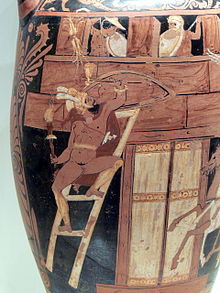Capaneus

InGreek mythology,Capaneus(/kəˈpæn.juːs/;Ancient Greek:ΚαπανεύςKapaneús) was a son ofHipponousand eitherAstynome(daughter ofTalaus)[2]orLaodice(daughter ofIphis),[3]and husband ofEvadne,with whom he fatheredSthenelus.[4]Some call his wifeIaneira.[5]
Mythology[edit]
According to the legend, Capaneus had immense strength and body size and was an outstanding warrior. He was also notorious for his arrogance. He stood just at the wall ofThebesduring the war of theSeven against Thebesand shouted thatZeushimself could not stop him from invading it.Vegetiusrefers to him as the first to use ladders in a siege.[6]InAeschylus,he bears a shield with a man without armour withstanding fire, a torch in hand, which reads 'I will burn the city,' in token of this. While he was mounting the ladder, Zeus struck and killed Capaneus with a thunderbolt, and Evadne threw herself on her husband's funeral pyre and died.[7]His story was told byAeschylusin his playSeven Against Thebes,[8]byEuripidesin his playsThe SuppliantsandThe Phoenician Women,[9]and by the Roman poetStatius.[10]
Popular culture[edit]
- In the fourteenth canto of hisInferno,Dantesees Capaneus in the seventh circle (third round) of Hell. Along with the other blasphemers, or those "violent against God", Capaneus is condemned to lie supine on a plain of burning sand while fire rains down on him. He continues to curse the deity (whom, being a pagan, he addresses as "Jove" [Jupiter]) despite the ever harsher pains he thus inflicts upon himself, so that God "thereby should not have glad vengeance."
- InEzra Pound's poemHugh Selwyn Mauberley,Capaneus is mentioned, with the implication that Mauberly (and by extension Pound himself) shared the ancient hero's daring and over-confidence.
See also[edit]
Notes[edit]
- ^J. Paul Getty Museum92.AE.86.
- ^Hyginus,Fabulae70
- ^ScholiaonEuripides,Phoenissae189; onPindar,Nemean Ode9.30
- ^Apollodorus,3.10.8
- ^Scholia on Pindar,Olympian Ode6.46
- ^Vegetius,De re militari4.21
- ^Euripides,The Suppliants983 ff.;Sophocles,Antigone133;Ovid,Metamorphoses,9. 404; Apollodorus, 3.6.6–3.7.1; Hyginus,Fabulae243;Philostratus of Lemnos,Eikones2.31;Ars Amatoria3.21
- ^Aeschylus,Seven Against Thebes423 ff.
- ^Euripides,Phoenissae1172 ff.
- ^Statius,Thebaid10.927
References[edit]
- Aeschylus,translated in two volumes. 1.Seven Against Thebesby Herbert Weir Smyth, Ph. D. Cambridge, MA. Harvard University Press. 1926.Online version at the Perseus Digital Library.Greek text available from the same website.
- Apollodorus,The Librarywith an English Translation by Sir James George Frazer, F.B.A., F.R.S. in 2 Volumes, Cambridge, MA, Harvard University Press; London, William Heinemann Ltd. 1921. ISBN 0-674-99135-4.Online version at the Perseus Digital Library.Greek text available from the same website.
- Euripides,The Complete Greek Dramaedited by Whitney J. Oates and Eugene O'Neill, Jr. in two volumes. 1. The Suppliants, translated by E. P. Coleridge. New York. Random House. 1938.Online version at the Perseus Digital Library.
- Euripides,Euripidis Fabulae.vol. 2.Gilbert Murray. Oxford. Clarendon Press, Oxford. 1913.Greek text available at the Perseus Digital Library.
- Euripides,The Complete Greek Drama,edited by Whitney J. Oates and Eugene O'Neill, Jr. in two volumes. 2. Phoenissae, translated by Robert Potter. New York. Random House. 1938.Online version at the Perseus Digital Library.
- Euripides,Euripidis Fabulae.vol. 3.Gilbert Murray. Oxford. Clarendon Press, Oxford. 1913.Greek text available at the Perseus Digital Library.
- Gaius Julius Hyginus,Fabulae from The Myths of Hyginustranslated and edited by Mary Grant. University of Kansas Publications in Humanistic Studies.Online version at the Topos Text Project.
- Philostratus the Elder.Imagines,translated by Arthur Fairbanks (1864–1944). Loeb Classical Library Volume 256. London: William Heinemann, 1931.Online version at the Topos Text Project.
- Philostratus the Lemnian (Philostratus Major),Flavii Philostrati Opera. Vol 2.Carl Ludwig Kayser. in aedibus B. G. Teubneri. Lipsiae. 1871.Greek text available at the Perseus Digital Library.
- Publius Ovidius Naso,Metamorphosestranslated by Brookes More (1859–1942). Boston, Cornhill Publishing Co. 1922.Online version at the Perseus Digital Library.
- Publius Ovidius Naso,Metamorphoses.Hugo Magnus. Gotha (Germany). Friedr. Andr. Perthes. 1892.Latin text available at the Perseus Digital Library.
- Publius Papinius Statius,The Thebaidtranslated by John Henry Mozley. Loeb Classical Library Volumes. Cambridge, MA, Harvard University Press; London, William Heinemann Ltd. 1928.Online version at the Topos Text Project.
- Publius Papinius Statius,The Thebaid. Vol I-II.John Henry Mozley. London: William Heinemann; New York: G.P. Putnam's Sons. 1928.Latin text available at the Perseus Digital Library.
- Sophocles,The Antigone of Sophocles edited with introduction and notes by Sir Richard Jebb. Cambridge. Cambridge University Press. 1893.Online version at the Perseus Digital Library.
- Sophocles,Sophocles. Vol 1: Oedipus the king. Oedipus at Colonus. Antigone.With an English translation by F. Storr. The Loeb classical library, 20. Francis Storr. London; New York. William Heinemann Ltd.; The Macmillan Company. 1912.Greek text available at the Perseus Digital Library.
External links[edit]
